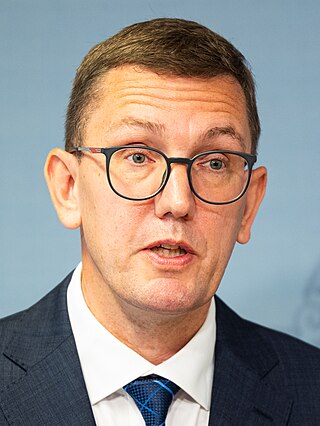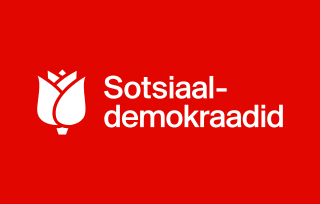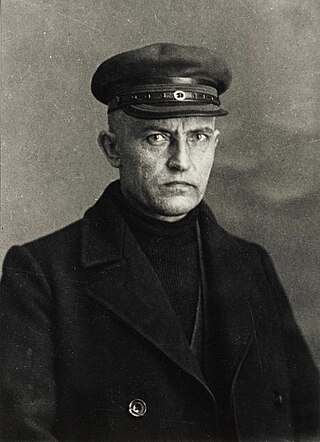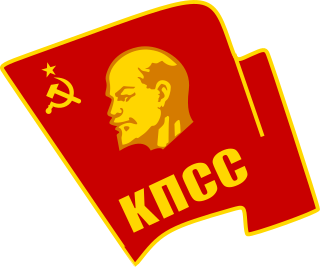GroenLinks is a green political party in the Netherlands.

The Estonian Centre Party is a populist political party in Estonia. It was founded in 1991 as a direct successor of the Popular Front of Estonia, and it is currently led by Mihhail Kõlvart.

The People's Union of Estonia was a political party in Estonia. Its last leader was Margo Miljand.

The Slovenian People's Party is a conservative, agrarian, Christian democratic political party in Slovenia. Formed in 1988 under the name of Slovenian Peasant Union as the first democratic political organization in Yugoslavia, it changed its name to Slovenian People's Party in 1992. On 15 April 2000, it merged with the Slovene Christian Democrats to form the SLS+SKD Slovenian People's Party, and changed its name in 2001 to Slovenian People's Party.
The Social Democratic Party of Lithuania is a centre-left and social democratic political party in Lithuania. Founded as an underground Marxist organisation in 1896, it is the oldest extant party in Lithuania. During the time of the Soviet Union, the party went into exile, emerging once again after the end of communist rule in 1989.

The prime minister of Estonia is the head of government of the Republic of Estonia. The prime minister is nominated by the president after appropriate consultations with the parliamentary factions and confirmed by the parliament (Riigikogu). In case of disagreement, the parliament can reject the president's nomination and choose their own candidate. In practice, since the prime minister must maintain the confidence of parliament in order to remain in office, they are usually the leader of the senior partner in the governing coalition. The current prime minister is Kristen Michal of the Reform Party. He took the office on 23 July 2024 following the resignation of Kaja Kallas.

The Social Democratic Party is a centre-left political party in Estonia. It is currently led by Lauri Läänemets. The party was formerly known as the Moderate People's Party. The SDE has been a member of the Party of European Socialists since 16 May 2003 and was a member of the Socialist International from November 1990 to 2017. It is orientated towards the principles of social-democracy, and it supports Estonia's membership in the European Union. From April 2023, the party has been a junior coalition partner in the third Kallas government.
This article gives an overview of liberalism and centrism in Estonia. It is limited to liberal and centrist parties with substantial support, mainly proved by having had a representation in parliament. The sign ⇒ denotes another party in that scheme. For inclusion in this scheme it is not necessary that the party has labeled itself as a liberal party.

The Evangelical People's Party was a minor progressive Protestant political party in the Netherlands. It is one of the predecessor parties of the modern-day GroenLinks.

Jaan Tõnisson was an Estonian statesman, serving as the Prime Minister of Estonia twice during 1919 to 1920, as State Elder from 1927 to 1928 and in 1933, and as Foreign Minister of Estonia from 1931 to 1932.
People's Party of Republicans and Conservatives was an Estonian political party, which existed under this banner from 1994 to 1998.

Jaan Anvelt, was an Estonian Bolshevik revolutionary and writer. He served the Russian SFSR, was a leader of the Communist Party of Estonia, the first premier of the Soviet Executive Committee of Estonia, and the chairman of the Council of the Commune of the Working People of Estonia. Imprisoned during Joseph Stalin's Great Purge in 1937, he died from the injuries sustained during a beating by Aleksandr Langfang while in NKVD custody.
The Communist Party of Estonia (CPSU) (Estonian: Eestimaa Kommunistlik Partei; Russian: Коммунистическая партия Эстонии, romanized: Kommunisticheskaya partiya Estonii) was a political party in Estonia. The party was initially known as Communist Party of Estonia (on CPSU platform) (EKP (NLKP platvormil)), and was formed in 1990 through a split in the original Communist Party of Estonia (EKP). The split occurred at the 20th congress of EKP in March 1990, as a reaction against the decision of the congress to separate EKP from the Communist Party of the Soviet Union and rebrand itself into the Estonian Democratic Labour Party (EDTP). Immediately after the independence decision of EKP, the pro-Soviet delegates left the congress venue. The convened their own rival 20th congress on March 26, 1990. EKP (NLKP platvormil) elected its own Central Committee, headed by its First Secretary Alexander Gusev, and would function as a separate party from EKP.

The Communist Party of Estonia was a regional branch of the Soviet communist party which in 1920–1940 operated illegally in Estonia and, after the 1940 occupation and annexation of the country by the Soviet Union, was formally re-merged into the USSR's All-Union Communist Party (bolsheviks) and operated as part of the CPSU until 1990.

The Estonian United Left Party, informally Left Alliance, is a left-wing political party in Estonia undergoing reformation.
The Letter of 40 intellectuals, also The letter of 40, originally A public letter from Estonian SSR was a public letter dated October 28, 1980 and posted a week later, in which 40 intellectuals attempted to defend the Estonian language and expressed their protest against the recklessness of the Republic-level government in dealing with youth protests sparked a week earlier by the banning of a public performance by the band Propeller. The real reasons were much more deep-seated, and had to do primarily with the Russification policies of the Kremlin in occupied Estonia.
Sirje Kingsepp is an Estonian politician and celebrity.

Eerik-Niiles Kross is an Estonian politician, diplomat, former chief of intelligence and entrepreneur. He is a member of parliament (Riigikogu). During the 1980s, Kross was a prominent figure in the anti-Soviet non-violent resistance movement in Soviet Estonia. After re-independence, in 1991, he joined Estonia's Foreign Ministry. He served as the head of intelligence from 1995 to 2000; and as national security advisor to former President Lennart Meri in 2000 and 2001.











